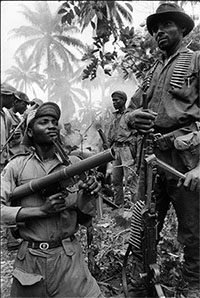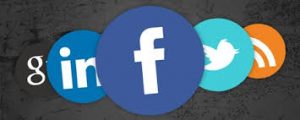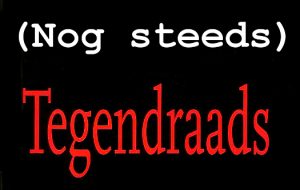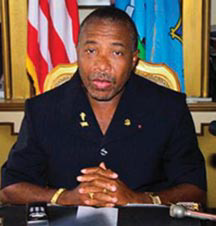Stephen Ellis & Gerrie ter Haar ~ Africa’s Religious Resurgence And The Politics Of Good And Evil
Charles Taylor, the former president of Liberia, can be found every workday sitting in the dock of a small, bright, ultramodern courtroom in The Hague. Taylor is accused of responsibility for some of the gravest crimes imaginable— atrocities committed in Liberia’s neighbor to the northwest, Sierra Leone, during that country’s 1991–2002 civil war. The crimes include authorizing mass recruitment of child soldiers, mass rape, and hacking off the hands of hundreds of people. Yet Taylor is known as a man who devotes considerable attention to religious matters. His example serves as a reminder that combining the practice of religion with the use of extreme violence is not as unusual as one might think.
The ex-president does not dispute that these crimes actually occurred. Nor does he deny that equally terrible things happened in his own country during the war that was fought there, off and on, between 1989 and 2003. But the charges against him concern Sierra Leone, not Liberia. And he maintains that the atrocities perpetrated in Sierra Leone were none of his doing. It is the first time an African head of state has ever stood trial before an international tribunal. Taylor is appearing before the Special Court for Sierra Leone—a hybrid body created jointly by the state of Sierra Leone and the United Nations. The case is being heard in the Netherlands rather than West Africa for security reasons: Taylor still has a few influential friends in the region.
Most of the time Taylor, born in Liberia in 1948, resembles nothing so much as the benign patriarch of a wealthy family. He wears a dark business suit, a silk tie, and lightly tinted glasses. He has a chunky gold watch on his wrist. He chats affably with his lawyers. Yet not only is he standing trial for war crimes; his eldest son, Charles Taylor Jr., better known as “Chuckie,” currently awaits trial in Florida on charges of torture. Taylor’s speeches, in the days when he was Liberia’s head of state (1997–2003), were full of extravagant references to Jesus. He once declared to a mass rally that Jesus Christ was the true president of Liberia, and he is often described as having been a Baptist preacher. It is also reported that he joined the Nation of Islam during the year when he was held in a Massachusetts jail awaiting extradition to his home country. (Taylor had escaped to America from Liberia in 1983—apparently with $900,000 of government money in his possession—after a dispute with the country’s military dictator. Detained by us authorities at the request of the Liberian government, which wanted to try him for embezzlement, Taylor escaped from the Plymouth House of Correction in 1985.)
Read more: https://openaccess.leidenuniv.nl/ASC-071342346-186-01.pdf?
Will California Show The Way To The Rest Of The US On Health Care?
 Since the election of Donald Trump to the presidency, the news coming out of the US are gloomy and pessimistic. Yet, resistance to Trumpism is growing across the country, and there are even highly encouraging developments at the state level, such as the effort to introduce a universal health care system in the state of California.
Since the election of Donald Trump to the presidency, the news coming out of the US are gloomy and pessimistic. Yet, resistance to Trumpism is growing across the country, and there are even highly encouraging developments at the state level, such as the effort to introduce a universal health care system in the state of California.
Indeed, on June 1, California senators voted to replace private health insurance with a single-payer system. Senate Bill 562, by senators Ricardo Lara and Toni Atkins, passed 23-14, and will now advance to the Assembly where the measure would require two-thirds vote in both chambers to become law.
Clearly, the June 1 vote by California senators is an initial step towards the adoption of a government-run universal health care system, but it already signifies a major political victory for progressives in the United States, who have long advocated for a publicly-funded health care system. The proposed measure, i.e., SB-562, was backed by an economic analysis undertaken by The Political Economy Research Institute (PERI) of the University of Massachusetts at Amherst. It’s lead author, Distinguished Professor of Economics and Co-Director of PERI Robert Pollin, introduced the study at a Capitol news conference a day before the State Senate vote — a move that was undeniably instrumental in the passing of SB-562 which cleared the first huddle towards the replacement of private health insurance in California with government-run health care. The full content of the aforementioned study can be downloaded at the link below.
Link: PollinZetZalZECONOMICZANALYSISZOFZCAZSINGLE-PAYERZPROPOSAL—5-31-17 (1)
The Nigerian-Biafran War
 May 30 2017 marks the 50th birthday of the declaration of independence of the republic of Biafra, leading up to a 30-month civil war between federal Nigerian troops and the (Igbo) secessionists. On the occasion of this anniversary, the Library, Documentation and Information Department at the African Studies Centre in Leiden (ASCL) has compiled a web dossier on the Nigerian Civil War (1967–1970), also known as the Biafran War.
May 30 2017 marks the 50th birthday of the declaration of independence of the republic of Biafra, leading up to a 30-month civil war between federal Nigerian troops and the (Igbo) secessionists. On the occasion of this anniversary, the Library, Documentation and Information Department at the African Studies Centre in Leiden (ASCL) has compiled a web dossier on the Nigerian Civil War (1967–1970), also known as the Biafran War.
Far from being an exhaustive or even representative overview of the record of scholarship that has appeared on this topic, this dossier is an attempt to highlight different discourses reflected in the ASCL Library’s collection. After the introduction, section 2 presents a selection of publications on the war, ranging from a 1967 propaganda leaflet by the Nigerian government of information (Unity in Diversity) to a 2016 article on ‘the tensions in Nigeria-Biafra war discourses’. A highlight of this section is a collection of student essays on the civil war written in 1971 at the Toro teacher’s college. The cahiers were donated by their teacher, Aart Rietveld. Noteworthy is also the civil war chapters in the textbook series on civics and history for primary schools.
The third section deals with fictional accounts, personal narratives and poetry on the Biafran conflict, illustrating how much more literature there is than the (rightly famous) writings of Ken Saro-Wiwa, Adichie and Achebe.
Sections 4,5 and 6 capture the conflict through the biographical lenses of key actors. Writings by and about the two political protagonists, General Gowon (Nigerian head of state 1966–1975) and General Ojukwu (president of Biafra 1967–1971), give an insight into the federal and Igbo perspectives of the conflict. The third person chosen for this biographical section is the Yoruba nationalist Obafemi Awolowo, who was active as Federal Commissioner for Finance in Gowon’s cabinet during the war. Chinua Achebe portrays Awolowo as the architect of the starvation policy meant to crush the Igbo defence: “It is my impression that Chief Obafemi Awolowo was driven by an overriding ambition for power, for himself in particular and for the advancement of his Yoruba people in general. […] In the Biafran case it meant hatching up a diabolical policy to reduce the numbers of his enemies significantly through starvation […].”(There was a country, p. 233). This view contrasts strongly with the almost hagiographic accounts of “the man of courage , wisdom, reason and vision” (according to Moses Makinde).
The dossier is concluded with a selection of web resources and is introduced by former LeidenASA fellow Jays Julius-Adeoye, who recently published ‘The Nigeria-Biafra war, popular culture and agitation for sovereignty of Biafra nation’ in the ASCL working paper series.
Digital Engagement In A Post-Factual World: Silos, Echo-Chambers And Lies
 What is communication?
What is communication?
What constitutes communication has always been historically contingent. It is never easy to pin down and designate ‘what is communication is’ and ‘what it is not’. But it is obvious that communication has taken many forms and evolved: from cave art to town criers, from street theatre to newspapers and television, and finally to digital engagement. One may argue that none of the aforementioned has influenced the world as much as digital engagement, making information available at your fingertips, changing the power dynamics for communicators, and transforming the way people can be influenced and their attitudes shaped. Here we try to explore issues of how digital engagement will thrive in a cynical, nationalist, populist world and raise the pertinent question: Does digital engagement encourage better decision-making, or merely reinforce prejudice?
The impact of Brexit and the USA presidential election
Two major events that gave “post truth” a linguistic footing were Brexit and the election of USA President Donald Trump. They showed that the world has indeed changed, and exposed the fact that people are making decisions based on emotions and beliefs. So, in the new world we live in, is evidence less important than beliefs? In the UK referendum on the EU, the #leave campaign claimed falsely that leaving the EU would mean that £350 million could be given to the National Health Service (NHS). After Brexit, thousands of people signed online petitions to have the result of the referendum reviewed. Gillian Tett, author of ‘The Silo Effect’ wrote, “The Brexit vote was decided on the basis of emotion – and the Remain camp failed to give voters a really positive vision of Europe.”
The impact of digital engagement on decision-making
Digital engagement was meant to make information more accessible to more people. But it has also made it possible for anyone to publish anything they want without having to provide evidence. As a result people find it hard to tell the difference between truth and lies. Fake news propagated on Facebook about the Pope supporting Trump and Trump’s tweets changing the direction of media coverage, makes one wonder whether digital engagement is encouraging propaganda and disinformation? Or whether people are making decisions based on emotions and do not care much about the facts?
In an interview with the Financial Times in June 2016 Adair Turner former Head of the Financial Services Agency (FSA) said, “I was once a confident optimist and rationalist. I also used to believe that everybody could be persuaded by rational argument. I’ve increasingly realised that people need mythologies, people need nationalisms and people need religions.”
Power to the powerless?
Digital engagement was thought to level the playing field and give power to the powerless (as in Arab Spring). It was believed to be a way to re-engage voters, in particular young people, with politics, giving a voice to the voiceless. Instead, it has given the powerful another weapon to acquire even more power. It favours those who shout loudest, responsible for the growth of ‘populism’ and government by Twitter. Today, anyone with a smartphone can voice an opinion, create an opinion train and broadcast beliefs. Communication becomes a political process when this happens, as opinion formation and counter-commonsensical visions gain popularity and contribute to undermining democracy. Perhaps this may have inspired the OECD, which has recently called on schools to teach young people how to identify fake news. Read more
Harrie Timmerman ~ (Nog steeds) Tegendraads
 Aangezien de eerste druk van mijn boek Tegendraads (Rozenberg Publishers, 2007, 978 90 5170 853 0) is uitverkocht, heb ik dankbaar gebruik gemaakt van de mogelijkheid om dit boek als e-book te herdrukken. De reden daarvoor is dat politie en justitie, hoewel er de laatste jaren meerdere gerechtelijke dwalingen aan het licht zijn gekomen, niet willen toegeven dat zij fouten maken. Laat staan dat zij daarvan willen leren teneinde nieuwe blunders te voorkomen. Waardoor ze nog steeds levens van onschuldige mensen ruïneren.
Aangezien de eerste druk van mijn boek Tegendraads (Rozenberg Publishers, 2007, 978 90 5170 853 0) is uitverkocht, heb ik dankbaar gebruik gemaakt van de mogelijkheid om dit boek als e-book te herdrukken. De reden daarvoor is dat politie en justitie, hoewel er de laatste jaren meerdere gerechtelijke dwalingen aan het licht zijn gekomen, niet willen toegeven dat zij fouten maken. Laat staan dat zij daarvan willen leren teneinde nieuwe blunders te voorkomen. Waardoor ze nog steeds levens van onschuldige mensen ruïneren.
Aangezien er in de afgelopen tien jaar in de beschreven zaken wel nieuwe ontwikkelingen zijn geweest, zal aan de desbetreffende hoofdstukken nieuwe tekst worden toegevoegd. In de oorspronkelijke tekst zijn ook type- en taalfouten verbeterd.
Het eerste hoofdstuk, getiteld Over de auteur, is geschreven door mede-auteur Willem de Haan. Vandaar dat hierin over mij in de derde persoon wordt geschreven en citaten van mij worden aangehaald.
Zowel in de nieuwe als oude tekst heeft Bart FM Droog bij de e-bookversie de rol vervuld van redacteur. Dankzij hem is de tekst (nog) duidelijker geworden, waarvoor mijn hartelijke dank.
Lees hier (Nog steeds) tegendraads van Harrie Timmerman, het ruim 300 pagina’s tellende boek van Harrie Timmerman, in de Verplichte kost-reeks van de NPE, als gratis downloadbaar pdf-document.
Er is inmiddels ook een webversie-verschenen, waarin enkele tv-documentaires en radio- en tv-interviews met Timmerman zijn opgenomen. Zie:
http://www.bartfmdroog.com/droog/cct/timmerman/
Pdf-versie op: http://www.nederlandsepoezie.org/…/timmerman-nog-steeds-teg… (1,98 MB)
TED ~ Rutger Bregman ~ Poverty Isn’t A Lack Of Character; It’s A Lack Of Cash
“Ideas can and do change the world,” says historian Rutger Bregman, sharing his case for a provocative one: guaranteed basic income. Learn more about the idea’s 500-year history and a forgotten modern experiment where it actually worked — and imagine how much energy and talent we would unleash if we got rid of poverty once and for all.



